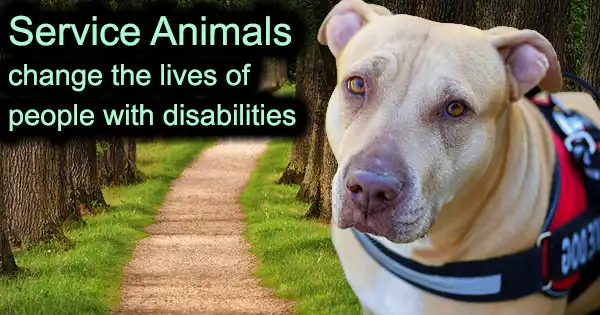Service Animals – Comfort and Help for those with Disabilities
Approximately 500,000 service dogs currently assist people with disabilities in the United States. When most people think of a service animal, the first thing that comes to mind is a guide dog for the visually impaired, but service animals assist people with a range of physical and mental disabilities including blindness, mobility issues, and mental disabilities such as post-traumatic stress disorder (PTSD). Service animals are much more than pets; they are animals highly trained to perform specific tasks according to an individual’s needs.

Service animals are much more than pets; they are animals highly trained to perform specific tasks according to an individual’s needs.
What is a Service Animal?
According to the Americans with Disabilities Act (ADA), a service animal is a dog that has been individually trained to do work or perform tasks for an individual with a disability.
Service dogs are selected for their good health, intelligence, and temperament and can be any breed; the most common are Labrador retrievers, golden retrievers and German shepherds.
The many tasks a service dog can perform for a person with a disability includes:
- Guiding a blind or vision impaired person while walking
- Pushing or pulling a wheelchair
- Alerting deaf and hearing-impaired people to sirens, alarms, doorbells, knocks on doors
- Retrieving water bottles, medications, or dropped objects
- Alerting and protecting a person who may have a seizure
- Reminding a person to take medication
- Sniff out allergens and alert the handler to harmful substances
- Alert a diabetic to low blood sugar
- Calm a person during a panic attack
- Distract a person from depression or harming themselves
- Call 911 or a support person in case of an emergency
It is important to note here that emotional support animals are not service animals.
A service animal receives special training to perform specific tasks for an individual with a disability. An emotional support animal provides companionship and can help with loneliness, anxiety, depression, and certain phobias, but while these animals may receive extensive training and interact with many different people, they do not have special training to perform specific tasks for an individual with a disability. This is the main difference between service animals and other working animals, including emotional support animals and therapy animals. Additionally, service animals have protected rights under the ADA, while emotional support animals do not.
If you have been denied disability don’t give up! Most are initially denied. Just call 512-454-4000 for a free, no obligation consultation to learn your options and have your questions patiently answered.
What ailments can be aided by a Service Animal?
While a service dog can make a huge difference in the life of a person with a disability, not every physical or mental disability qualifies as needing a service animal.
The ADA considers a person disabled if they have a mental or physical impairment that substantially limits one or more life activities; in other words, a person is disabled if their life is more difficult in some way compared to the average person. A doctor can evaluate the needs of an individual and make recommendations as to how a service dog might assist them.
The following are common physical and mental disabilities that can be aided through the use of a service dog:
- Blindness or vision impaired
- Deafness or hearing impaired
- Autism
- Multiple Sclerosis
- Paralysis
- Epilepsy
- Osteoporosis
- Arthritis
- Seizures
- Scoliosis
- Bipolar disorder
- PTSD
- Anxiety
- Depression
- Neurocognitive disorders
- Psychotic Disorders
- Substance Disorders
Though many establishments don’t allow pets, the ADA requires that service dogs be allowed to go wherever the general public can go.
Under Texas law, public accommodations include government buildings, public streets, sidewalks and public transportation to restaurants, hotels, stores, offices, and places for recreation and entertainment.
The definition of public accommodation under the ADA is also broad, including:
- Public transportation terminals and stations
- Schools, universities, and other educational institutions
- Hotels and other lodging
- Restaurants and establishments that serve food and drinks
- Sales and rental businesses
- Convention centers
- Theaters and sports venues
- Gyms, bowling alleys, and other places of recreation
- Libraries
- Museums and other exhibition facilities
- Social service centers
- Parks and other recreational facilities
- Recreational facilities, such as zoos and parks
Are there rules regulating Service Animals?
There aren’t many federal rules regulating service dogs.
A service dog is defined solely by its ability to perform a task that helps with its owner’s disability and is not required to be registered or certified by federal law or the State of Texas. There are companies that sell certifications, but they do not provide an animal with additional rights and are generally considered a scam. Service dogs are required to be leashed and under the control of the handler. When a service animal enters an establishment, staff cannot require documentation of either the dog or the individual.
The staff is only permitted to ask the following questions:
- Is your animal a service animal?
- What tasks is the animal trained to perform?
Staff is not permitted to ask:
- What is your disability?
- Does your animal have an ID card?
- Has your animal been certified as a service animal?
Under the ADA, it is not illegal to say a pet dog is a service dog, but many states, including Texas, have criminal penalties for falsely claiming an animal as a service animal.
Texas also has laws in place to prevent harassment of service animals and criminal penalties for denying access to service animals.
How does one get a Service Animal?
Unfortunately, service animals can be prohibitively expensive and are not covered by Medicare or Medicaid.
The National Service Animal Registry estimates that a trained service dog costs somewhere between $15,000 and $30,000. A person must also consider the expense of caring for a service animal, including food, regular veterinary care and preventive medications like heartworm and flea and tick control. The initial cost and subsequent care of a service dog can be overwhelming, but there are many non-profit organizations and businesses dedicated to providing service animals to the disabled.
Among them are:
- Guide Dogs of America
- Canine Companions for Independence
- Assistance Dog United Campaign
- Paws With a Cause
- America’s Vet Dogs
For a more extensive list of organizations, see: https://www.rover.com/blog/getting-a-service-dog.
Still, for some people with disabilities, having a service animal by their side is invaluable.
If you have a disability and are looking for a service dog, how do you go about finding the right service dog for you? Here are some possibilities:
- Through an organization specialized in training dogs for your specific condition.
- Have your dog trained by an organization.
- Train the dog yourself.
These organizations have knowledge and experience with particular disabilities and know how to train dogs for specific needs. They will also choose a dog that is a good fit and prepare you before getting the dog, as well as work with you after taking the dog home. The disadvantages of using an organization are that they are not cheap and usually have long waiting lists. For a good resource, see: Assistance Dogs International https://assistancedogsinternational.org/main/looking-for-an-assistance-dog
Some organizations, like Medical Mutts Service Dogs, offer “Board and Train” programs where your dog is taken into care and training by the organization for a period of time. In this case, you would have a trained dog much sooner, but the downside is that all dogs do not successfully complete the program. https://medicalmutts.org/
In this situation, you would need to find a trainer to guide you through training. Know that training is difficult and you will need to evaluate your physical challenges and ask yourself if you have enough time to devote to training. However, if you decide to take this route, you will learn to be a better handler to your dog. You can find certified dog trainers at the Certification Council for Professional Dog Trainers (CCPDT) website; https://www.ccpdt.org.
The impact a service animal can have in the life of a person with a disability cannot be overestimated.
In addition to performing tasks their handler cannot do, service animals provide companionship and a sense of independence and security. Finding and training the right service dog may take a long time, but for people with disabilities it is well worth the wait.
Disability benefits are an important source of income for those who are unable to work. If you are not able to work due to accident or illness, you may be eligible for Social Security Disability or Long Term Disability benefits. If you have applied for benefits and been denied, contact the attorneys at Bemis, Roach and Reed for a free consultation. Call 512-454-4000 and get help NOW.

Your Free Initial Consultation
Call now:
At Bemis, Roach and Reed, if we can't help you, we will try to find the right attorneys for you.
We offer each of our prospective clients a free no obligation one hour phone or office consultation to see if we can help you and if you are comfortable with us. We know how difficult a time like this can be and how hard the decisions are. If we can be of assistance to you and help you find a solution to your issue we will even if that means referring you to another attorney.
Let's get you Started:
If you could provide us with some basic information about your claim we will get right back with you with a free case evaluation and schedule your Free Consultation Today.







